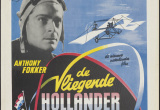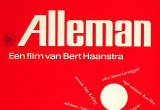Filmforum and the Verdict against Dutch Feature Films
In October 1957, the magazine Filmforum published an open letter to the producers of Dutch feature films. The letter was signed by seven Dutch film critics: Jan Blokker, Charles Boost, Janus van Domburg, Han G. Hoekstra, Anton Koolhaas, H.J. Oolbekkink and H. Wielek. In it, they wrote that Dutch feature films were severely lacking in quality. The critics argued that in the future, feature films should be directed by documentary filmmakers – or not made at all.
The letter was written after the first feature films had been made with the support of the Productiefonds voor de Nederlandse Film. Both Gerard Rutten's De vliegende Hollander and Kleren maken de man by German director Georg Jacoby were indeed fairly unsuccessful and certainly were not high-quality films that contributed to the enrichment of Dutch feature film. It was thus time for some self-reflection, according to the critics.
Financial Support
The Production Fund was founded in 1956 with the support of the Dutch government and the Nederlandse Bioscoopbond (NBB, Dutch Cinema Federation) in order to stimulate the production of feature films. It was difficult to begin production in the years just after WWII. Four films were made around this time -- Een koninkrijk voor een huis!, De dijk is dicht, Sterren stralen overal and Ciske de Rat – and despite the fact that these films drew nearly a million viewers, there wasn’t really much of a film industry to speak of yet. The Production Fund was tasked with setting up the financial conditions needed to create a healthy climate in which the film industry could thrive.
This was also the intention of the critics who’d signed the open letter. Van Domburg had already spoken up for an improvement of Dutch film and had demanded that the government and the film business work toward this. But by ‘improvement’, Van Domburg was mainly talking about the quality of film. He still held the Filmliga’s criteria for ‘good film’, drawn up prior to WWII, in high regard.
Turning Point
In the end, only three of the seven critics who signed the letter turned out to be behind its content: Blokker, Hoekstra and Koolhaas hadn’t even seen the letter before it was published, and Oolbekkink withdrew his support – although he had seen the letter. Koolhaas resigned from the editorial board of Filmforum and Van Domburg and Blokker (who was a reviewer for the national Dutch newspaper Algemeen Handelsblad) would pick up their battle axes and become each other’s eternal opponents.
In the meantime, Blokker was busy writing the scenario for the film Fanfare with Bert Haanstra, under the guidance of veteran producer Rudi Meyer. The film premiered in October 1958, two months after Fons Rademakers’ first film, Dorp aan de rivier. Fanfare was lauded and became a hit with audiences. The opinions on Dorp aan de rivier were more divided, but the film was nominated for the Oscar for best non-English-language film – the first time in Dutch history that a Dutch feature film was accorded this honour.
These were the first signs of a renaissance in Dutch feature film that would develop over the following two decades into a fully fledged film industry. The open letter was soon forgotten. Van Domburg, however, insisted he was right. When Fanfare premiered, he wrote in Filmforum that ‘the documentary style was the only solution to the impasse, just as it’s the only solution to all film impasses’.
more information
If you are looking for more material from our collection, please contact Film Sales:
sales@eyefilm.nl
phone +31 (0)20 5891 426



